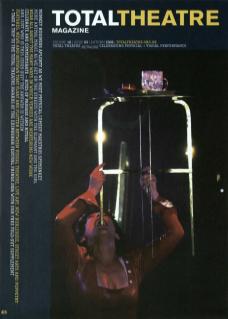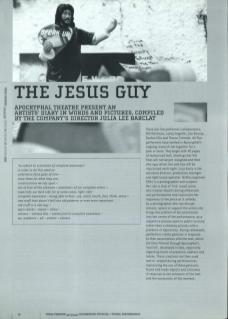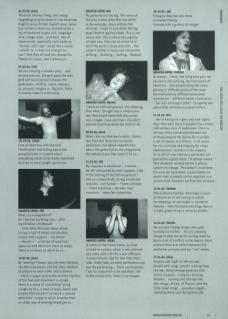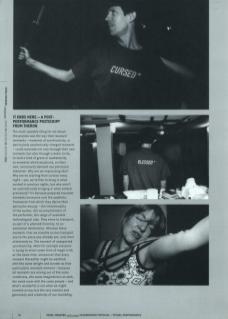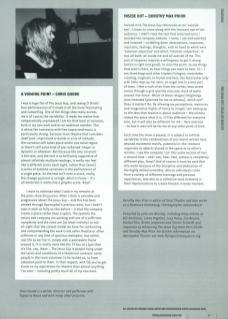in order to do this need to:
undermine false gods of now –
show them for what they are:
constructions we rely upon –
out of fear of the unknown + awareness of our complete selves –
especially our dark side (or in some cases, light side)
complete awareness = being able to hear, see, smell, touch, feel think, sense –
new stuff that doesn't fall into old patterns or even more important:
old stuff in a new way –
open senses – aware – allow –
witness – witness this – submission to complete awareness –
we, audience – all-submit + witness
There are five performer/collaborators: Bill Aitchison, Lukas Angelini, Zoe Bouras, Rachel Ellis and Theron Schmidt. All five performers have worked in Apocryphal's ongoing research lab together for a year or more. They begin with 40 pages of memorised text, knowing that the lines will not be pre-assigned and that who says which line and how will be improvised each night. Lucy Avery is the assistant director, production manager and light board operator. Birthe Jorgensen (Bib) is a photographer and sculptor. Her role is that of 'live' visual artist who creates objects during rehearsals and performances and improvises her responses to the piece as it unfolds. As a photographer who can disrupt, witness, ignore or support the action she brings the problem of documentation into the centre of the performance, as a subjective process open to public scrutiny rather than a shadowy process with a pretence of objectivity. During rehearsals, performers create gestures in response to their associations with the text, which are then filtered through Apocryphal's 'tool kit', developed in labs, especially regarding levels of presence, address and masks. These creations are then used and reshaped during performances, improvising the use of these gestures, found and made objects and costumes in response to the armature of the text and the necessities of the moment.
02.03.06: JULIA
The most obvious thing, and I keep forgetting to write about it: the American English versus British English issue. Jesus Guy written in America, and there are a lot of American tropes in it, language-wise, image-wise... and here, lots of those words, especially such words as 'shrinks' and 'cops' sound like a movie. I asked: so, is America a movie to you? And they all said yes, except for Theron of course, who's American...
04.03.06: LUCY
We are creating a shadow play... web of associations, the grid upon the text grid and associations between the performers: child vs. adult, memory vs. present, enigma vs. fascism. There is cruelty implicit in this play.
04.03.06: LUKAS
Lots of emotions with the text. Clarification and telling about the unexplainable in a world where everything seems to be badly explained as if we've been taught ignorance.
UNDATED ENTRY: ZOE
What is a strong belief? Do I believe anything now – after my Christian childhood? ... Even daily decision about where to buy a loaf of bread and whether to buy milk (organic – soy better – why etc.) – a myriad of questions spew out and decisions must be made. There is no fence on which to sit...
12.03.06: JULIA
By 'working' I mean, you can hear the text, see the movements and the inter-relation of players to each other and audience – there is space to breathe and the rhythms of the text and movement is varied... there is a sense of 'something' being caught by this, a kind of music heard and played that wouldn't be heard or played otherwise – a way in which it works that no other way of working would get to...
UNDATED ENTRY: BIB
My gestures are too big. The nerve of the play is that ultra thin line which is the everyday. Jesus without the miracles. I need to turn down the big prop/theatre/gallery mode. This is not about that. This is about the urgency of right now. How can an artist fit in here? My work is heavy and still... the subject matter is heavy but constantly shifting... Avoiding... Surfing... Asphalt.
UNDATED ENTRY: RACHEL
I realised with one gesture, the skipping, that what I thought was a simple easy one that would need little discussion was a bigger issue and that I shouldn't assume anything about the work at all.
28.03.06: JULIA
What I did say that was helpful, I think, was that this show was not about perfection, but about imperfection, about the geeky kid on the playground, the awkward one that doesn't fit in...
31.03.06: ZOE
My response is emotional – I cannot... be left untouched by what happens. Like in the making of the Shame gesture I had an unexpectedly strong emotional reaction. I am human – I have a history – I have reactions – my own, real reactions – deep felt sometimes.
UNDATED ENTRY: LUKAS
It starts to feel like a home, as if we arrived to a place, which is not unknown any more, and still life is just different in every minute. But for the first time I look, really look, at other performers and see the performing. There are moments I am far away from it all and then I am in the middle of it. There is no escape.
09.04.06: ZOE
Trying to describe this show to friends/family: 'a poem with a gallery of images'.
UNDATED ENTRY: THERON
As always, I think, the thing that gets me excited is the echoing, the invocation of absences – two people doing the same gesture in different parts of the room but with entirely different emotional resonances – different levels of presence – but was echoing in time – occupying the space that someone occupied before...
11.04.06: BILL
... We've had good nights and bad nights, days that were more enjoyable than others and various sizes of audiences. There is not any clear connection between any of these despite the desire for a system, a set of causes and effects. It all seems far too intricate and slippery for clean explanations. So too is it too slippery for a set of rules that as a performer will guarantee a good show. I'm always aware that whatever worked before is always subject to change. This doesn't invalidate the work we have done, it just makes me aware that it should not be regarded as a system that insulates me from the moment.
13.04.06: THERON
One audience member described a sense of liberation at not having to watch for meaning, as one might in narrative theatre – that liberated watching-ness is a really great thing to strive to enable.
16.04.06: RACHEL
We are now finding things that push boundaries further... We are allowing things to play out as far as they need to. Quite a lot of conflict in the impros. More mixture than ever before between the performer persona and our 'real' selves.
17.04.06: JULIA
Dreams last night of offices and people with wings, people running from the law, doing strange gestures with tennis racquets, tiring but exciting dreams... running into therapy too, this image, of Zoe, of Theron, with the little angel wings... guardian angels, standing there, just doing their job.
It End Here – A Post-performance Postscript from Theron
The most valuable thing for me about the process was the way that resonant moments – moments of synchronicity, or a particularly aesthetically charged moment – could resonate not only through their own moments but also through a wider circle, to lend a kind of grace or authenticity to moments which would not, on their own, necessarily demand any particular attention. Why are we improvising this? Why are we starting from scratch every night – yes, we're free to bring in what worked in previous nights, but why aren't we automatically bringing in what worked previously? It's because prepared resonant moments announce only the aesthetic framework from which they derive their particular beauty – the intentionality of the author, the accomplishment of the performer, the range of available technological aids. They serve to transport, as part of a planned itinerary, to an emotional destination. Whereas these moments that we stumble across transport you to the place you already are, only more attentively so. The moment of unexpected synchronicity, when for example everyone is trying to enact some form of magic trick at the same time, announces that every moment thereafter might be watched with the same delight and wonder as that particularly resonant moment – because all moments are arising out of the same conditions, the same imaginations at work, the same room with the same people – and what's wonderful is not what we might stumble across but the very manner and generosity and creativity of our stumbling.
A Viewing Point – Chris Goode
I was a huge fan of The Jesus Guy, and seeing (I think) four performances of it made it all the more fascinating and compelling. One of the things that really excites me is of course the variability. It made me realise how comparatively unprepared I am for that level of variance, both in my own work and as an audience member. This is where the connexion with free improvised music is particularly strong: because most theatre that considers itself part-improvised or builds in a lot of latitude, the variation still takes place within one tonal region or there's still some kind of pre-ordained 'shape' or dynamic or whatever. But because the only constant is the text, and the text is so brilliantly supportive of almost infinitely multiple readings, it really can feel like a different piece each night, rather than (even) a series of extreme variations in the performance of a single piece. So the text isn't even a score, really the change quotient is so high: which is funny – it's all words but it works like a graphic score. Neat!
I want to reiterate what I said in my remarks at the post-show discussion. What I think is valuable and progressive about The Jesus Guy – and this has been seeded through Apocryphal's previous work, but I hadn't seen it work as fully as this before – is that the company create a place rather than a space. The systems the actors and company are working with are of a sufficient complexity and the rules are (at least initially) so out-of-sight that the closest model we have for confronting and comprehending the work is not other theatre or other artforms or any kind of specious metaphor, but rather, real life as we live it, simply with a permeable frame around it. It is vastly more like the 73 bus at 11pm than it's like, say, Ibsen... The Jesus Guy is people living under the terms and conditions of a theatrical contract: some people in the room volunteer to be looked at, to have attention paid to them. In that respect, with TJG you've got closer to my aspirations for theatre than almost anything I've seen – including pretty much all of my own work.
Inside Out – Dorothy Max Prior
Invited in to The Jesus Guy rehearsals as an 'outside eye', I chose to come along with the innocent eye of the audience. I didn't read the text that Julia had sent; I avoided the company website. I came, I sat and watched and listened – scribbling down observations, responses, reactions, feelings, thoughts, with no heed to which were ‘external-objective' and which ‘internal-subjective'. It was all both: all inside me and all outside of me. This sort of response requires a willingness to get it wrong (which is right and good), to miss the point, to see things that aren't there, to hear things you want to hear. So – I see three kings and other triplets/trilogies, motorbikes crashing, stigmata on hands and feet, the Nutcracker lady with little imps up her skirt, an angel lost in a bad part of town. I feel a rush of air from the corner, hear street noises through a grid and the staccato clack of water poured into metal. Which of these images/imaginings were intended (planned for me to witness), which not? Does it matter? No. By allowing my perceptions, memories and imaginative flights of fancy to mingle I am owning up to the idea that theatre is about audience – the witness makes the piece what it is. It'll be different for everyone else, but it will also be different for me – here and now – to how it was/will be for me at any other point in time.
Each time the show is played, it is subject to infinite variability in the combinations of pre-learnt written text, devised movement motifs, potential in-the-moment responses to objects placed in the space or to other's actions. I see the company 'run' this same section of text a second time- and I see, hear, feel, witness a completely different play. Great! And of course it must be said that this works because of the discipline and dedication of the highly skilled ensemble, who as individuals come from a variety of different trainings and previous experiences, and who as a collective work tirelessly in their improvisations to create theatre in every moment.
Dorothy Max Prior is editor of Total Theatre and also works as a freelance dramaturg, choreographer and producer.
Compiled by Julia Lee Barclay, including diary entries of Bill Aitchison, Lukas Angelini, Lucy Avery, Zoe Bouras, Rachel Ellis, Birthe Jorgensen and Theron Schmidt and responses to witnessing The Jesus Guy from Chris Goode and Dorothy Max Prior. For further information on Apocryphal Theatre see www.flyingoutofsequence.org
